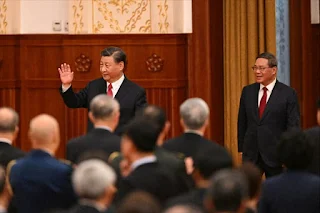According to a report by Central News Agency on the 22nd, the article pointed out that in 2012 , Xi Jinping became the top leader of the Communist Party of China. At the Third Plenary Session of the 18th Central Committee of the Communist Party of China held in 2013 , the outside world focused on Xi Jinping's economic policy direction. But shortly after the meeting, a member of the Communist Party of China said that if people only analyze important meetings of the Communist Party of China from the perspective of economy, business, and money, or have high expectations for the meetings, " they will make a big mistake . " Because the most important thing in China is political power, not economy.
Nakazawa Katsuji's article points out that the outside world focused on the Third Plenary Session of the 18th CPC Central Committee and related documents, which mentioned " letting the market play a decisive role in resource allocation " and allowing private enterprises to enter areas dominated by state-owned enterprises. But in the end, the freedom of private enterprises and market-oriented reforms were not achieved or were diluted. Under the protection of the party, state-owned enterprises became more bloated.
In fact, the article points out that Xi Jinping is completely focused on something else, which is to accelerate the anti-corruption campaign against " tigers " and " flies " to enhance his own power. One of those who was taken down was Zhou Yongkang, a former member of the Standing Committee of the Political Bureau of the Communist Party of China. This is the first major and extremely risky action of Xi Jinping to eliminate political enemies and consolidate power.
The article describes that even old China experts, party cadres or other observers cannot see Xi Jinping's true intentions. Those who attended the Third Plenary Session of the 18th Central Committee of the Communist Party of China could not have predicted Xi's anti-corruption campaign.
The article also pointed out that the Third Plenary Session of the 18th CPC Central Committee reviewed and passed the " Decision of the CPC Central Committee on Several Major Issues Concerning Comprehensively Deepening Reforms . " An old Chinese intellectual who still remembers China's reform and opening-up period in the 1980s said that by issuing the document, Xi Jinping implicitly told CPC members that the open era of former CPC leader Deng Xiaoping had given way to his " new era . "
Xi Jinping's new era, both economically and politically, began at the Third Plenum of the 18th CPC Central Committee. It is now clear that China's economic policies reversed at that time, and Xi Jinping concentrated power by launching an anti-corruption campaign. When Xi Jinping began to deviate from the path of reform and opening up, then-Premier Li Keqiang was unable to guide him back.
Xi Jinping's economic policy direction became more obvious after his second term, and the Chinese government began to suppress Alibaba. If the "let the market play a decisive role in resource allocation" mentioned in the Third Plenary Session of the 18th Central Committee was implemented, Alibaba would not have been suppressed.
The article stated that now in Xi Jinping's third term, there is no one like Li Keqiang to try to challenge Xi Jinping, nor is there an economic successor to inherit China's years of reform and opening-up policies.
Nakazawa Katsuji believes that if there are any clues about the direction of economic policies at this year's Third Plenary Session of the 18th CPC Central Committee, it will be possible to grasp the key clues only by looking at the meeting from a political perspective, rather than focusing only on the economic-related descriptions in the communiqué.


It reveals a shift from Deng Xiaoping's open era to a centralized "new era."
ReplyDeleteInformative
ReplyDeleteInformative
ReplyDelete